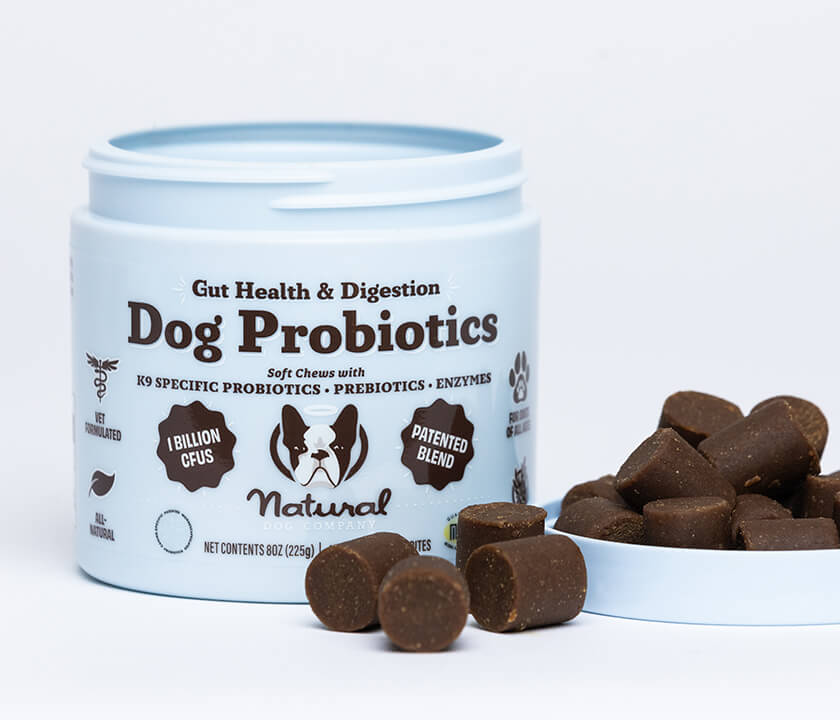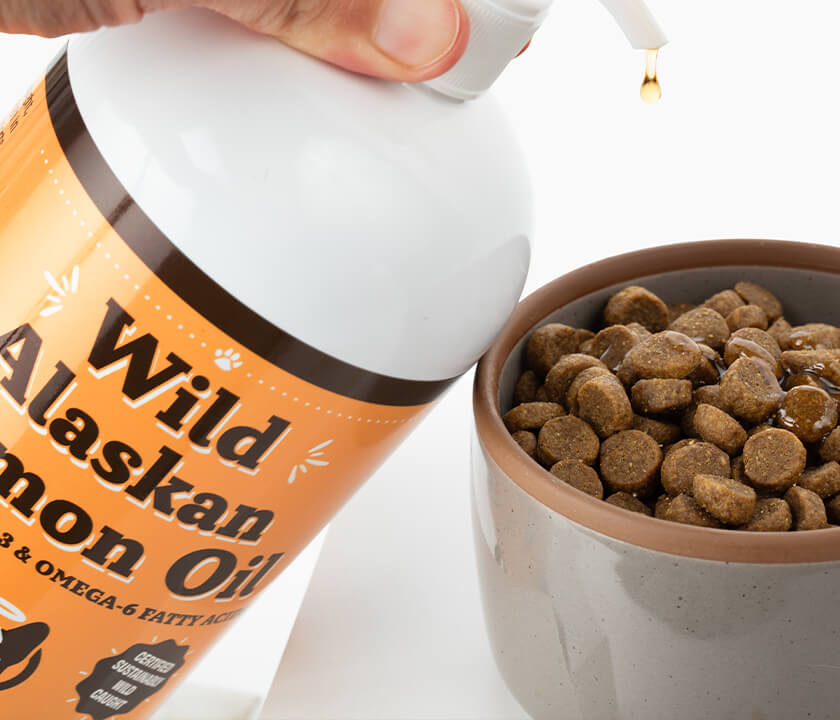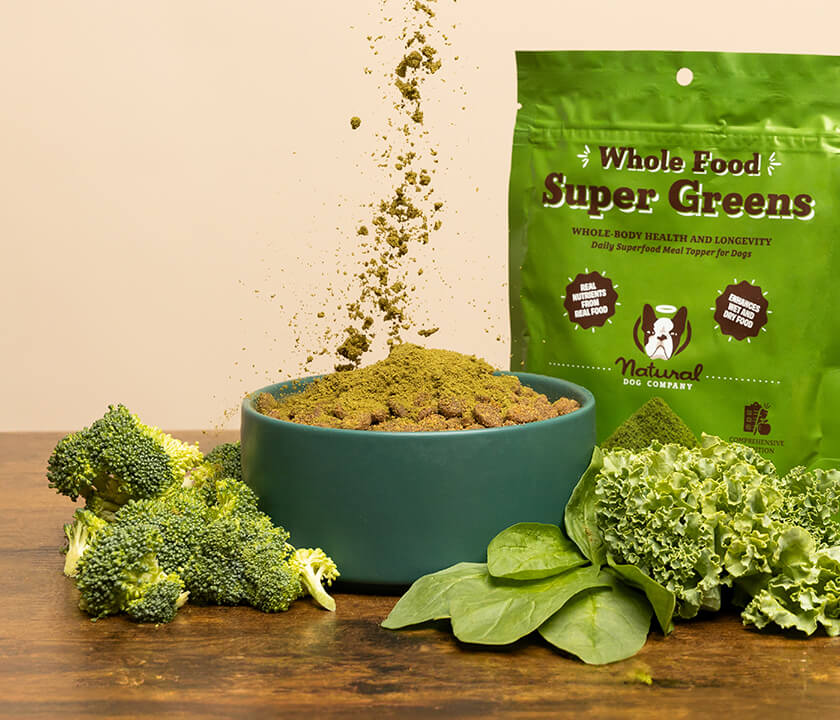French Bulldogs have taken over couches, cities, and social feeds, and hearts—and it’s easy to see why. They’re expressive, people-oriented clowns wrapped in compact, muscular, adorable bodies.
But there’s a trade-off that most Frenchie parents discover quickly: these dogs are highly likely to experience skin and ear problems, especially with deep wrinkles and during allergy season.
The good news is that, with a solid skincare routine and a good relationship with your vet, most Frenchie skin issues are manageable—and many flare-ups can be avoided or soothed with proper care.
Skip ahead to: How to Support Your French Bulldog’s Skin, or read on to learn more about your dog's unique body.
Why Do French Bulldogs Have So Many Skin Issues?
Frenchies are almost purpose-built for sensitive skin.
A few features stack the deck:
Wrinkles and skin folds everywhere
Frenchies typically have deep nasal folds, lip folds, a neck roll, and often a tight tail pocket. Anywhere skin touches skin, you get friction, trapped moisture, and reduced airflow—perfect conditions for inflammation and bacterial growth. Using wrinkle-friendly grooming products can help keep these folds clean.
Brachycephalic (flat-faced) anatomy
Brachycephalic breeds in general have a high burden of skin-fold irritation and frequent ear problems. French Bulldogs are one of the main breeds driving those stats, though these problems also affect breeds like Pugs, Boxers, Boston Terriers, Pekingese, and more.
Allergy-prone immune systems.
Frenchies show up frequently in studies of canine skin issues—chronic, itchy skin discomfort and inflammation driven by environmental allergens and a weak skin barrier. Allergies often need to be managed from the inside out.
Yeast and bacterial overgrowth in the folds.
Yeast and bacteria are normal inhabitants of dog skin, but the areas where wrinkle meets wrinkle give them an easy opportunity to overgrow and cause discomfort and unhealthy skin. Healthy yeast & bacterial balance can be supported with careful grooming and a healthy microbiome in the gut.
Altogether, you have a small, snuggly body that retains heat and moisture with lots of wrinkles and a tendency toward allergies. That’s why Frenchies often need a more structured skin-care routine than the average dog.
Signs Your French Bulldog Might Have a Skin Problem
Frenchies are expressive, so you’ll often see, smell, or feel signs of a skin problem early if you know what to watch for.
Common red flags include:
- Red, moist, or scabby skin inside facial folds, lip folds, or tail pocket
- A sour, “cheesy,” or musty smell coming from wrinkles or paws
- Brown, waxy buildup in skin folds
- Persistent paw licking or chewing, often with pink or rusty-colored staining between the toes
- Rubbing their face along carpets or furniture, or scooting their butt on the carpet
- “Hot spots”: painful, moist, rapidly spreading sores where your dog has chewed, licked, or scratched intensely
- Greasy, flaky, or thickened skin with a strong odor
- Itchy, painful ears with related: head shaking, scratching, odor, or discharge
What Causes French Bulldog Skin Issues?
Most Frenchie skin problems cluster into a few overlapping buckets. Your dog may be experiencing several at once.
Environmental Allergies
Sometimes, Frenchies’ immune systems have a strong reaction to things like pollen, dust mites, molds, and other environmental allergens.
A typical Frenchie allergy pattern looks like this:
- Itchy paws, face, and ears
- Recurrent ear infections or inflammation
- Hot spots that keep coming back
- Seasonal itch that may eventually become year-round
Through a mix of allergen avoidance, medications that your vet may prescribe to control dog skin itch and inflammation, topical products to help repair the skin barrier, and in some cases, allergen-specific immunotherapy (“allergy shots” or drops) you can help keep things in control for your Frenchie.
Food Sensitivities and Food Allergy
True food allergies are less common than environmental allergies, but Frenchies do pop up in food allergy case series.
When diet is a culprit, you’re more likely to see:
- Non-seasonal itch (symptoms all year)
- Dry, red, or inflamed skin on the face, paws, or belly
- Recurrent ear infections
- Soft stool or other GI signs happening alongside skin issues
Diagnosis still relies on the gold standard: a strict elimination diet for several weeks using a novel-protein or hydrolyzed-protein diet recommended by your vet, followed by deliberate reintroduction of old ingredients.*
Flea Allergies & Flea Bite Irritation
Even if you rarely see fleas, flea allergies can be a major amplifier of itch in Frenchies. For dogs with FAD, a single flea bite can trigger intense inflammation and itching that lasts long after the flea is gone.
Classic flea allergy signs include:
- Intense chewing and scratching
- Red, inflamed skin over the tail base, rump, and back of the thighs
- Scabs and hair loss in these regions
Because French Bulldogs are already prone to itch from other causes, flea allergy can be the spark that turns a mild situation into a severe flare-up. That’s why year-round flea prevention is critical, even for mostly indoor dogs.

Skin-Fold Dermatitis
Skin-fold dermatitis is the headline condition for Frenchies. It refers to inflammation and bacterial imbalance between skin surfaces that are touching—exactly what you have in nasal folds, lip folds, neck folds, and tail pockets.
Inside those folds, skin rubs against skin, moisture from tears or saliva gets trapped, oxygen is limited, and yeast and bacteria have a warm, protected place to bloom.
You might see:
- Red, raw, or slimy skin inside folds
- Thick brown or white discharge from the ears
- A sour, “corn chip” or cheese-like smell
- Your dog pawing at their face or resisting when you touch certain wrinkles
Mild skin-fold irritation can often be handled with smart home care and topical products, but recurrent or severe cases are medical issues, not just grooming problems. Your vet may need to do cytology from folds, prescribe medicated wipes or creams, and in extreme cases consider surgical correction of deep, chronically infected folds.
Yeast and Bacterial Overgrowth
Yeast imbalance that leads to skin irritation is a very common secondary issue in dogs with seasonal or environmental allergies. Yeast (especially Malassezia species) is part of the normal skin flora, but when the barrier is disrupted and the skin stays moist, they can explode in number and cause greasy, smelly, inflamed skin.
Bacteria can also opportunistically harm damaged skin and cause hot spots or other uncomfortable, painful skin sores.
Parasites, Hormones, and Other Causes
A smaller slice of Frenchie skin problems are driven by:
- Mites (mange) causing hair loss, crusts, and intense itch
- Hormonal issues such as hypothyroidism
- Autoimmune or immune-mediated skin diseases
These are less common but important to consider if your dog isn’t responding to typical allergy and infection protocols.
How to Support Your French Bulldog’s Skin
Frenchie skin care is less like a one-time project and more like a home-care protocol—especially for wrinkles and allergies. Here’s how to build a plan with your vet.
Start with a Dermatology-Minded Vet Visit
Before you start changing foods or buying shampoos, get a full exam with a focus on folds, paws, and ears. Ask your vet to:
- Perform cytology from problem areas (folds, ears, paws) to check for yeast and bacteria
- Rule out mites and other parasites as needed
- Talk through seasonality, diet history, home environment, and previous treatments
That baseline work lets you target the real drivers, not just mask the itch.
If you're dealing with stubborn skin problems, it may be worth finding a certified Veterinary Dermatologist who can get to the root of the issue.
Build a Frenchie-Specific Fold-Care Routine
Because folds are such a big deal in brachycephalic breeds, many dogs need lifelong, proactive skin-fold care.
With your vet’s guidance, you can:
- Clean wrinkles with a vet-approved wipe or solution
- Gently lift and separate the fold so you can reach the skin inside
- Dry thoroughly after swimming—don’t leave skin damp where moisture can be trapped
- Watch for redness, odor, or discharge and notice changes quickly
Some Frenchies do well with fold care once or twice per week; others—especially in warm, humid climates or with heavy folds—may need daily cleaning during high-risk seasons.
Using Natural Dog Company Wrinkle Wipes to gently clear moisture, gunk, and bacteria from their skin folds, then following with Wrinkle Balm to soothe, moisturize, and help protect the skin barrier, can be a smart routine for these pups because both products are specifically designed for wrinkly dogs, use dog-safe, nourishing ingredients, and help reduce the risk of irritation, odor, and recurring skin-fold flare-ups.
Bathe Smart with Clean, Beneficial Products
Think in terms of “clean and dry”:
Use only dog-safe, vet-recommended shampoos, especially if your dog already has yeast or bacterial issues
- Rinse completely so no residue is left on sensitive skin
- Dry thoroughly, especially in folds, armpits, groin, and between toes
- Use skin products that use clean, high-quality ingredients
Your vet may layer in medicated shampoos, mousses, or sprays when yeast or bacteria are confirmed.
Address Hot Spots Quickly to Soothe Skin
While hot spots can sneak up on us, especially if they're in harder-to-see places or come on quickly, addressing these uncomfortable skin sores quickly is an essential way to maintain overall skin health.
Our Skin Soother Balm can help provide quick topical relief of normal itching to help protect your dog's skin. High-quality ingredients like chamomile, lavender, coconut oil, and Vitamin E work together to soothe irritated skin and promote healing. This formula is also available in Skin Soother Wipes—travel-friendly, convenient disposable wipes for mess-free application and soothing benefits.
In some cases, a surgical cone or recovery suit may be recommended to help prevent your Frenchie from licking, scratching, and chewing hot spots and making them worse.
Feed a Clean, Dog-Appropriate Diet
When food allergy is suspected:
- Plan a proper elimination diet* with your veterinarian—don’t bounce between kibbles hoping one will “stick”
- Choose a truly novel or hydrolyzed protein source
- Commit to a full trial period of the new food, then reintroduce old foods strategically under the guidance of your vet
Even if food allergy isn’t the main driver, your vet might suggest omega-3 fatty acids to support the skin barrier, or a skin-supportive diet at maintenance calories (since excess weight can worsen fold problems and friction). In those cases, a high-quality fish oil like Natural Dog Company's Wild Alaskan Salmon Oil can be a nice add-on: it’s a pure source of EPA and DHA omega-3s that helps to nourish the skin from the inside out, support a healthy coat, and promote overall immune, joint, and heart health—making it a good fit for wrinkle-prone dogs who need both skin support and careful weight management.
Lock In Year-Round Flea Protection
Because even one flea bite can set off weeks of intense itching in allergic dogs, flea allergy is not something you want in the mix. VCA's guide to Flea Allergies in Dogs is a simple overview you can read and discuss with your veterinarian.
Work with your veterinarian to choose a flea product that fits your dog’s health, local parasite risks, and your ability to give it consistently.
Recheck, Refine, and Repeat
Frenchie skin care is dynamic. Follow-ups matter when infections keep returning; medications stop working as well, new areas suddenly flare, or your dog is still itchy even though the skin looks better.
Revisiting the plan with updated cytology, culture, or additional testing keeps you from chasing symptoms while the underlying issues evolve.
Quick FAQ for Frenchie Parents
Why do my Frenchie’s wrinkles smell so bad?
Odor from wrinkles usually means trapped moisture and overgrowth of yeast and/or bacteria inside the folds. It’s a medical issue, not just a grooming problem. Your vet can confirm with a medical test and help you design a fold-care and treatment plan.
How often should I clean my French Bulldog’s wrinkles?
There’s no one-size-fits-all answer. Many Frenchies need fold care several times per week; those with deep folds, heavy allergies, or in hot/humid climates may need daily cleaning during flare-prone seasons. Your vet can customize a schedule based on your dog’s anatomy and history.
Are French Bulldogs more prone to skin problems than other dogs?
Yes, unfortunately in French Bulldogs are much more likely to inherit or develop skin problems compared to the general dog population and to many other breeds.
Can diet alone fix my Frenchie’s skin?
Diet can be powerful—especially when a food allergy is part of the problem—but it rarely solves everything by itself. Think of nutrition as one piece of a larger holistic plan that also includes fold care, flea and parasite control, allergy management, and consistent grooming and cleansing.
The Bottom Line for Frenchie Skin
French Bulldogs are hilarious, affectionate little powerhouses wrapped in a lot of skin—and that skin needs extra help.
If you remember nothing else, remember this:
- Wrinkles need a routine. Skin-fold irritation is a major brachycephalic problem, and Frenchies are right in the middle of it.
- Allergies are common, not rare. Early itching, ear problems, or paw chewing are worth taking seriously and talking about with your vet.
- Fleas are not optional. For an allergic Frenchie, a couple of bites can undo weeks of progress—so year-round prevention is non-negotiable.
- Skin care is a protocol, not a product. The magic is in the combination: smart home care, targeted medications, diet strategy, and regular check-ins.
With that approach, your Frenchie stands a much better chance of being comfortable in their own skin—and spending their energy on snoring, snuggling, and being the world-class clown you signed up for.
* For practical guidance on how to run an elimination diet correctly, see Tufts Petfoodology’s article on elimination diet trials.




![[31461221859421]](http://naturaldog.com/cdn/shop/products/WRBM4T.png?v=1619893343)
![[43188197916765]](http://naturaldog.com/cdn/shop/files/WP-WRIN-50_2795bbd8-5a35-4f84-8444-c73e3314b376.jpg?v=1712939505)
![[31461214388317]](http://naturaldog.com/cdn/shop/products/SNSR4T.png?v=1619895004)

![[31461216714845]](http://naturaldog.com/cdn/shop/products/SKSR4T.png?v=1619894449)
![[43188193951837]](http://naturaldog.com/cdn/shop/files/WP-SKSR-50_6da0d719-0736-4684-a85c-63d729d1f6af.jpg?v=1712939476)
![[39469531824221]](http://naturaldog.com/cdn/shop/products/WASO-01.jpg?v=1680299053)








